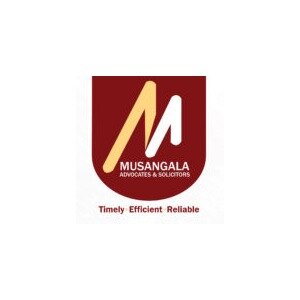Best Restructuring & Insolvency Lawyers in Kampala
Share your needs with us, get contacted by law firms.
Free. Takes 2 min.
List of the best lawyers in Kampala, Uganda
About Restructuring & Insolvency Law in Kampala, Uganda
Restructuring and insolvency law in Kampala, Uganda governs the processes businesses and individuals follow when they are unable to pay their debts. These legal frameworks provide mechanisms for reorganizing troubled businesses, facilitating the orderly exit of insolvent companies, and protecting the rights of creditors while also considering the interests of debtors. With Kampala being the commercial hub of Uganda, many entities and individuals sometimes face financial hardships requiring either structured resuscitation or, in severe cases, orderly liquidation. The goal of restructuring is to help viable businesses adjust their finances or operations to regain profitability, while insolvency procedures focus on fairly distributing assets among creditors if a business cannot recover.
Why You May Need a Lawyer
Facing financial distress can be overwhelming and legally complex. Engaging an experienced restructuring and insolvency lawyer in Kampala can be crucial in the following situations:
- Your business is struggling to meet its debt obligations or is facing creditor pressure.
- You are a creditor seeking to recover dues from an individual or business showing signs of insolvency.
- You are unsure about your options or rights in situations of debt restructuring, receivership, or liquidation.
- You wish to negotiate new terms with lenders or other stakeholders while limiting legal risk.
- You need guidance on voluntary arrangements, administration, or bankruptcy proceedings.
- You are interested in buying assets from distressed businesses.
- You require advice on directors' duties and risks in times of financial uncertainty.
- You are facing litigation related to debts, guarantees, or insolvency claims.
A lawyer can provide tailored advice, represent you in court, assist in negotiations, and ensure compliance with Uganda's regulations.
Local Laws Overview
Restructuring and insolvency in Kampala are mainly governed by the Insolvency Act, 2011 and its amendments, alongside subsidiary regulations like the Insolvency Regulations, 2013. Key aspects include:
- Corporate Insolvency: Procedures for winding up (liquidation), receivership, and administration are provided. These set out how the distressed company's assets are managed, preserved, or sold, and how creditors are paid.
- Personal Insolvency: Individual bankruptcy is managed under the Insolvency Act, allowing for debt relief and asset distribution in a fair manner.
- Debt Restructuring: Options such as company voluntary arrangements and schemes of arrangement allow parties to agree on new terms, subject to court approval in certain cases.
- Creditors' Rights: The law prescribes how creditors can give notice, claim outstanding amounts, and object to arrangements or liquidations.
- Directors' Duties: Company directors owe fiduciary duties and must avoid transactions that unfairly prejudice creditors when insolvency looms.
- Cross-Border Insolvency: Provisions exist for international cooperation where assets or stakeholders span multiple countries.
- Regulatory Authorities: The Official Receiver under the Uganda Registration Services Bureau (URSB) oversees official insolvency proceedings.
Frequently Asked Questions
What is the difference between restructuring and insolvency?
Restructuring refers to the process of reorganizing a company’s finances or operations to restore stability and profitability, while insolvency is the state where a person or business cannot pay its debts as they fall due and may need to be wound up or reorganized under the law.
Who can initiate insolvency proceedings in Uganda?
Both creditors and debtors can initiate insolvency proceedings. A debtor may voluntarily declare insolvency, or creditors can apply to court to commence insolvency if debts remain unpaid.
What are the main types of insolvency procedures in Kampala?
The main procedures are liquidation (winding up), receivership, administration, and bankruptcy for individuals. Each serves different purposes based on the financial state and goals of the business or individual.
What happens to employees during company insolvency?
Employees’ contracts may be terminated or continued under new arrangements. Wages and terminal benefits are usually recognized as preferential debts, giving employees a priority claim during asset distribution.
How are creditors paid in insolvency?
Assets are distributed according to statutory priority, with secured creditors and preferential debts (such as employee wages) paid first, followed by unsecured creditors and then shareholders if any surplus remains.
Can an insolvent individual or company continue operating?
Depending on the restructuring plan approved by creditors and the court, operations can continue under supervision while the business implements changes or settles debts.
What options are there for out-of-court settlement of debts?
Informal settlements, negotiated payment plans, or formal schemes of arrangement can be agreed between debtors and creditors, sometimes avoiding the need for court proceedings.
Are directors personally liable for company debts?
Generally, directors are not personally liable unless they have given personal guarantees or engaged in wrongful or fraudulent trading. They must, however, act responsibly and in creditors' best interests when insolvency is imminent.
What role does the Official Receiver play?
The Official Receiver, typically a regulator under the Uganda Registration Services Bureau, supervises the process, manages asset collection and distribution, and oversees compliance with the law.
How can I challenge an insolvency order or liquidation?
Interested parties may object or appeal through the courts, especially if they believe the procedure is unjustified or was conducted improperly. Legal representation can help ensure your rights are protected throughout the process.
Additional Resources
If you require more information, consider consulting the following bodies and resources:
- Uganda Registration Services Bureau (URSB) - Official government agency for business and insolvency processes
- Uganda Law Society - Can assist with finding qualified insolvency lawyers
- Commercial Court Division, High Court of Uganda - Handles insolvency disputes and applications
- Published guides from commercial banks and business associations in Kampala regarding debt management and restructuring
- Legal aid clinics and non-profit organizations offering free or subsidized legal advice on insolvency
Next Steps
If you or your business is facing financial distress in Kampala, Uganda, consider taking the following steps:
- Assess your financial situation and gather relevant documents about your debts and assets.
- Consult with a qualified restructuring and insolvency lawyer for a professional evaluation of your options.
- Discuss available legal procedures, negotiate with creditors, and explore restructuring options before insolvency escalates.
- If necessary, prepare to initiate formal insolvency proceedings under the guidance of your legal representative.
- Stay proactive and informed throughout the process to maximize protection of your interests and rights.
Early legal intervention can often prevent more severe consequences and provide the best chance for recovery or an orderly resolution.
Lawzana helps you find the best lawyers and law firms in Kampala through a curated and pre-screened list of qualified legal professionals. Our platform offers rankings and detailed profiles of attorneys and law firms, allowing you to compare based on practice areas, including Restructuring & Insolvency, experience, and client feedback.
Each profile includes a description of the firm's areas of practice, client reviews, team members and partners, year of establishment, spoken languages, office locations, contact information, social media presence, and any published articles or resources. Most firms on our platform speak English and are experienced in both local and international legal matters.
Get a quote from top-rated law firms in Kampala, Uganda — quickly, securely, and without unnecessary hassle.
Disclaimer:
The information provided on this page is for general informational purposes only and does not constitute legal advice. While we strive to ensure the accuracy and relevance of the content, legal information may change over time, and interpretations of the law can vary. You should always consult with a qualified legal professional for advice specific to your situation.
We disclaim all liability for actions taken or not taken based on the content of this page. If you believe any information is incorrect or outdated, please contact us, and we will review and update it where appropriate.

















